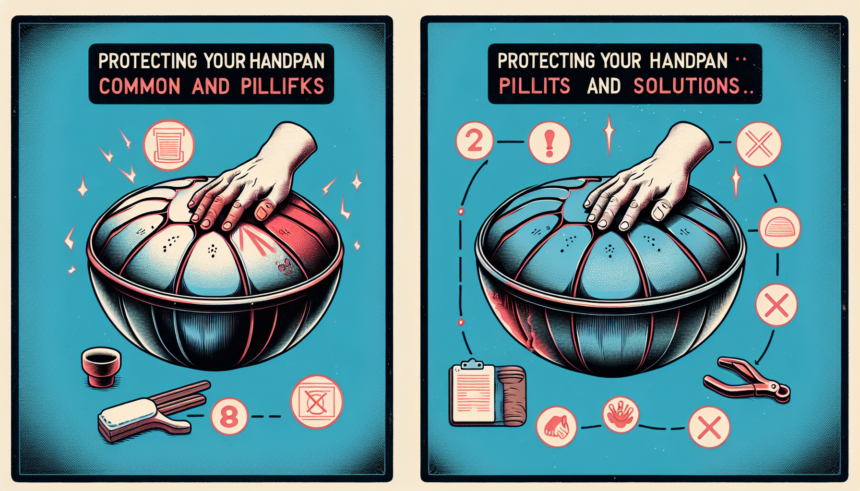<!DOCTYPE html>
<html lang="en">
<head>
<meta charset="UTF-8">
<meta name="viewport" content="width=device-width, initial-scale=1.0">
<title>Article on Protecting Your Handpan</title>
<style>
body {
font-family: Arial, sans-serif;
line-height: 1.6;
margin: 20px;
}
h2 {
color: #333;
}
ul {
margin-left: 20px;
}
</style>
</head>
<body>
<h2>Introduction</h2>
<p>The handpan, with its ethereal sounds and sleek design, is more than just a musical instrument; it's an investment in art, tradition, and personal peace. Proper care and protection of your handpan are critical to preserving its unique sound and structural integrity. This article will explore common pitfalls related to handpan care and provide effective solutions to ensure your instrument remains in pristine condition for years to come.</p>
<h2>Understanding the Handpan</h2>
<p>Before delving into care essentials, it’s important to understand what a handpan is. A handpan is a percussion instrument designed from two metal hemispheres. Its origin dates back to the early 21st century, with the Hang in Switzerland being its precursor. Handpans are known for their ability to produce mesmerizing sounds that can transport listeners to a state of deep tranquility. Given their craftsmanship and materials, they require diligent care to maintain their distinctive sound quality.</p>
<h2>Common Pitfalls in Handpan Care</h2>
<h3>1. Improper Handling</h3>
<p>One of the most common pitfalls in handpan maintenance is improper handling. Many players inadvertently damage their instruments by not handling them with the necessary care. Dropping a handpan can cause dents and affect its tuning, which can be somewhat expensive to repair.</p>
<h3>2. Exposure to Moisture</h3>
<p>Handpans are made from metal, making them susceptible to rust and corrosion if exposed to moisture. Humid environments, rain, and even sweat can pose a risk to the integrity of the instrument. It’s crucial to limit exposure to such conditions.</p>
<h3>3. Inadequate Cleaning</h3>
<p>Due to their metal construction, handpans need regular cleaning. Skipping this can lead to a buildup of oils and dirt, further inviting rust. Inadequate cleaning can also alter the sound quality, affecting your playing experience.</p>
<h3>4. Improper Storage</h3>
<p>How you store a handpan significantly impacts its lifespan. Leaving it in direct sunlight or a damp area can lead to compromised sound quality and structural integrity. Many players overlook the importance of a proper storage solution.</p>
<h3>5. Neglecting Regular Maintenance</h3>
<p>Like any finely crafted instrument, handpans benefit from regular maintenance checks. Neglecting scheduled maintenance can result in unchecked damage or wear that could have easily been prevented with timely attention.</p>
<h2>Solutions for Handpan Protection</h2>
<h3>1. Use a Protective Case</h3>
<p>One of the simplest ways to ensure your handpan’s safety is by using a protective case when transporting or storing your instrument. A hard-shell case can protect against physical impacts, while a soft case is effective against dust and minor abrasions.</p>
<h3>2. Control the Environment</h3>
<p>Keeping your handpan in a stable, controlled environment is key. Aim to store your instrument at room temperature, away from direct sunlight and dampness. If you live in a humid climate, consider using a dehumidifier.</p>
<h3>3. Clean Regularly with Gentle Products</h3>
<p>Establish a regular cleaning routine using microfiber cloths to wipe off dust and smudges. Use mild soap and water, avoiding harsh chemicals. After cleaning, ensure the handpan is dry to prevent rust.</p>
<h3>4. Use a Handpan Stand</h3>
<p>Handpan stands are a great way to not only store your instrument safely but also display it elegantly. These stands prevent scratches and provide a stable support, keeping the handpan off potentially damaging surfaces.</p>
<h3>5. Schedule Routine Tune-Ups</h3>
<p>Just as you would take a car in for regular maintenance, consider scheduling periodic tune-ups with a professional handpan tuner. This step can identify issues early and ensure your instrument sounds optimal at all times.</p>
<h2>Conclusion</h2>
<p>Protecting your handpan involves understanding its vulnerabilities and taking proactive steps to mitigate any potential damage. From using protective cases and maintaining an optimal storage environment to regular cleaning and scheduled tune-ups, each measure converges on a singular mission – preserving the ethereal sound of this unique instrument. As handpans are not only a financial investment but also a spiritual one, their care reflects a commitment to preserving their voice for personal enjoyment and artistic expression.</p>
<h2>FAQs</h2>
<ul>
<li>
<strong>Q: Can I repair a dent on my handpan myself?</strong>
<br>
A: It is not recommended to repair dents on your own. The process can potentially cause more harm than good. Hiring a professional ensures the integrity of the handpan’s tuning is maintained.
</li>
<li>
<strong>Q: How often should I clean my handpan?</strong>
<br>
A: It is advisable to clean your handpan every few weeks, or more frequently if it is used heavily. Post-performance cleaning helps prevent build-up of oils and sweat.
</li>
<li>
<strong>Q: What should I do if my handpan gets wet?</strong>
<br>
A: Immediately dry it thoroughly with a soft cloth. It’s also essential to let it air dry in a controlled environment. If the handpan was heavily drenched, consider consulting a professional to guarantee there’s no internal damage.
</li>
<li>
<strong>Q: Is it safe to travel with a handpan on an airplane?</strong>
<br>
A: Yes, but it is essential to use a sturdy protective case. Some airlines allow you to carry it on as hand luggage, while others might require it to be checked in. Make arrangements that prioritize its safety.
</li>
<li>
<strong>Q: How can I spot rust on my handpan early?</strong>
<br>
A: Regularly inspect your handpan’s surface for any discoloration or rough patches, particularly in crevices and less noticeable areas. Early detection allows for swift treatment, preventing further damage.
</li>
</ul>
</body>
</html>Protecting Your Handpan: Common Pitfalls and Solutions

Leave a comment




